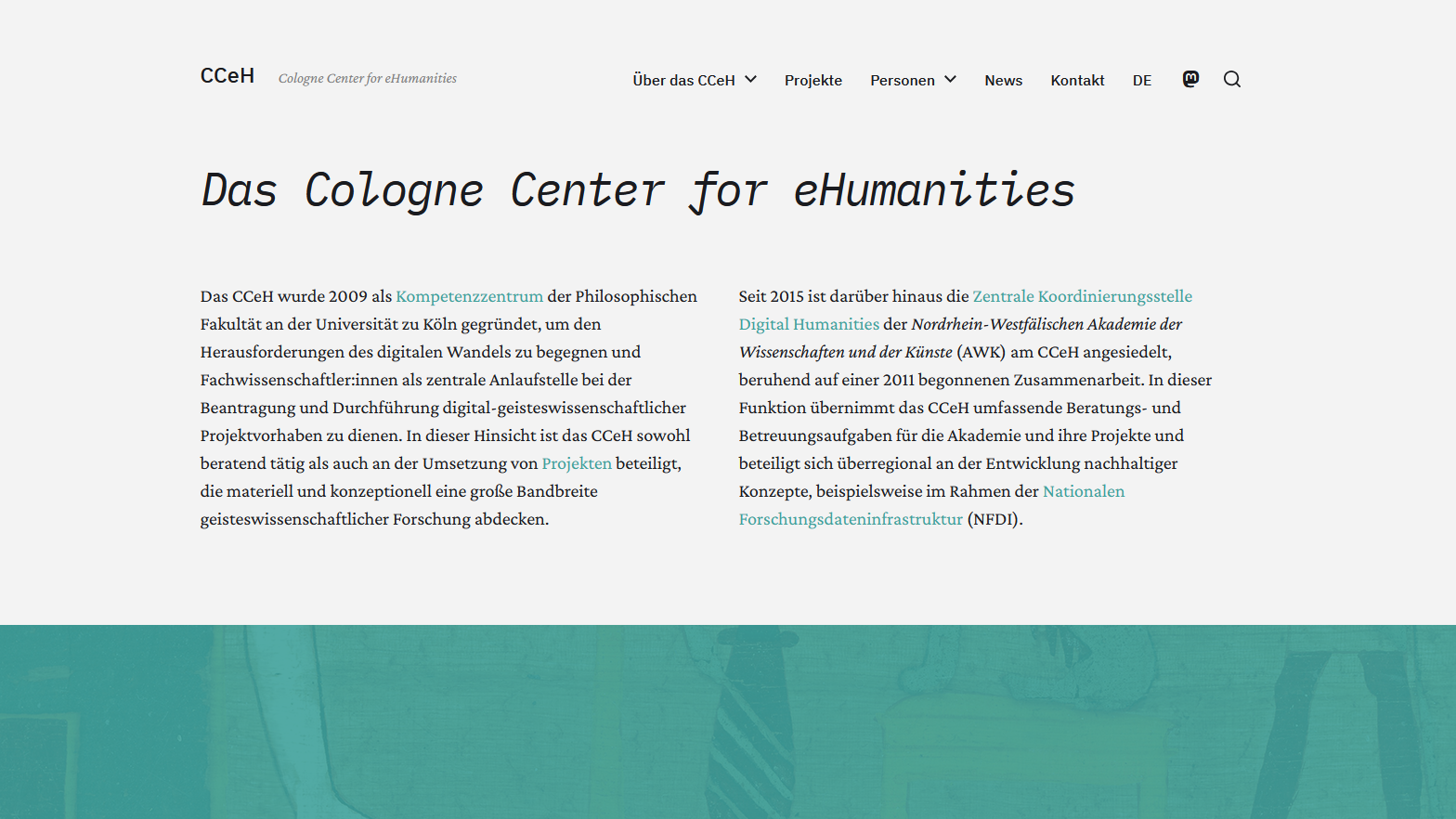The CCeH was founded in 2009 as a competence center of the Faculty of Arts and Humanities at the University of Cologne to meet the challenges of digital change and to serve as a central point of contact for scholars in the application and implementation of digital humanities projects. In this respect, the CCeH is both active in an advisory capacity and involved in the implementation of projects that cover a wide range of humanities research, both materially and conceptually.
Since 2015, the Central Coordination Office Digital Humanities of the North Rhine-Westphalian Academy of Sciences, Humanities and the Arts (AWK) has also been based at the CCeH, based on a collaboration that began in 2011. In this role, the CCeH takes on comprehensive advisory and support tasks for the Academy and its projects and participates in the development of sustainable concepts at a supra-regional level, for example as part of the National Research Data Infrastructure (NFDI ).
Projects
Our work focuses on the conception and implementation of cooperation projects. The portfolio provides information on past and current projects in which we have been and are involved as the CCeH.
“Yet, isn’t it true that all new ideas arise out of a milieu when ripe, rather than from any one individual?”1
This quote from Roberto Busa, one of the best-known pioneers of humanities computing, illustrates the extent to which developments in the field have always been characterized by collaborative efforts. At the CCeH, we have found that the use of computer-aided methods and processes in the humanities is particularly beneficial when it is accompanied by a collaborative working environment. In the digital humanities, this is often even formulated as a prerequisite.2 Such collaboration is not only concerned with the exchange between different subject cultures, i.e. creating a common ground for communication, but also and in particular with the training of truly interdisciplinary skills, which are already being taught to the next generation at the University of Cologne in the IDH degree programs as well as impacting different disciplines through the various project collaborations at the CCeH.
The Cologne DH cosmos runs across several institutions, although in practice it’s not as widely distributed as it may seem, given the proximity of space and personnel (office to office). While the IDH as the Institute for Digital Humanities is home to the Chairs of Historical-Cultural Information Processing and Linguistic Information Processing as well as a junior professorship for Digital Humanities (and can look back on a long institute history that originated in the 1990s), the DCH as the Data Center for the Humanities is available to all members of the Faculty of Arts and Humanities as an advisory body for research data management (RDM) issues.3 As a competence center, the CCeH focuses on the implementation of third-party funded projects. In this way, the various institutions complement each other and form the interdisciplinary spectrum required for the successful organization of DH activities.
- Roberto Busa, “The Annals of Humanities Computing: The Index Thomisticus,” in: Computers and the Humanities 14 (1980), pp. 83-90, here p. 64, DOI: 10.1007/BF02403798. ↩︎
- For a selection, see Willard McCarty and Marilyn Deegan (eds.), Collaborative Research in the Digital Humanities, Farnham: Ashgate, 2012, DOI: 10.4324/9781315572659; and Urszula Pawlicka-Deger and Christopher Thomson (eds.), Digital Humanities and Laboratories: Perspectives on Knowledge, Infrastructure and Culture, London: Routledge, 2023, DOI: 10.4324/9781003185932. ↩︎
- This refers to the sustainable preservation, documentation, availability and presentation of research data and results. Further information can be found on the DCH website as well as at https://forschungsdaten.info/ and in the context of the NFDI, where the NFDI4Culture, Text+, NFDI4Memory and NFDI4Objects consortia are relevant to the humanities. ↩︎
